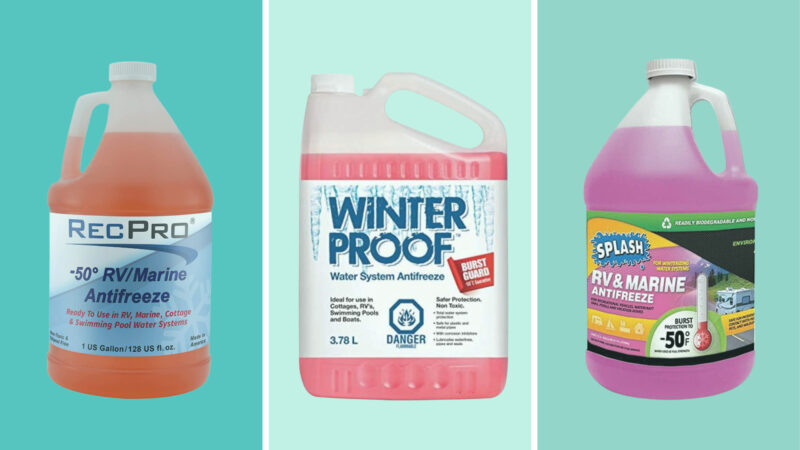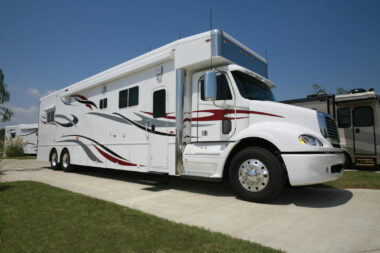Table of Contents Show
While shopping for RV accessories, you may come across RV antifreeze. It’s typically a bright pink color and comes in gallon jugs.
It’s an essential item to have on hand if you need to winterize your rig. Despite sounding similar, it isn’t the same as automobile antifreeze. So what’s the difference? Let’s find out.
What Is RV Antifreeze?
You can find many types of RV antifreeze, but they all serve the same purpose of protecting your RV’s plumbing system.
By filling your water lines with an approved product, you replace any water in the system with a liquid-resistant to freezing. This can save you from the hassle of a surprise leak or busted pipe.
If you live in a colder climate, you should use an RV-approved antifreeze to winterize your trailer at the end of each camping season.
However, winter can have unpredictable weather. Even areas like Texas and Florida, which typically stay warm year-round, can experience extended periods of freezing temperatures.
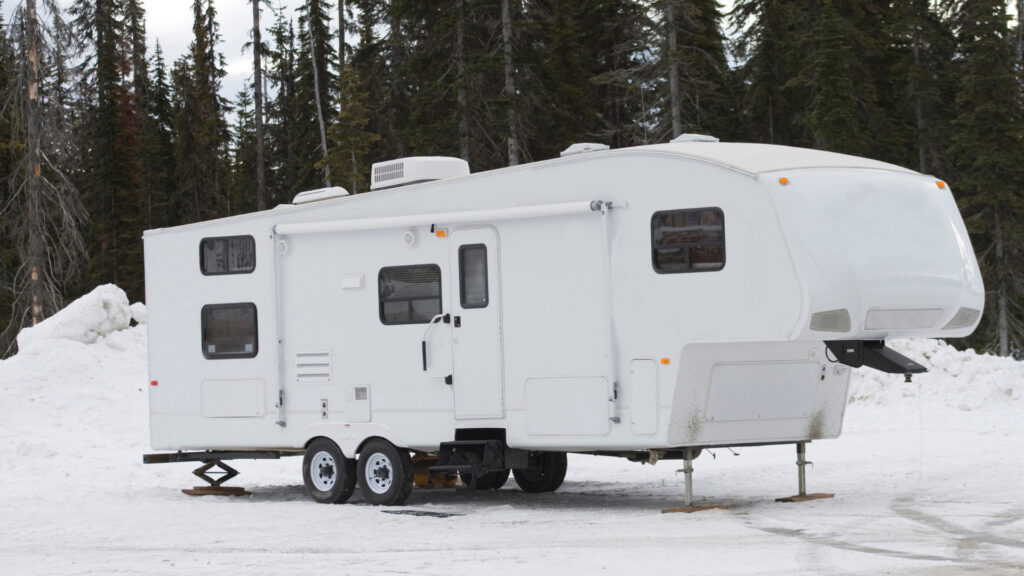
Is RV Antifreeze the Same as Regular Antifreeze?
No, RV antifreeze and regular motor antifreeze are very different products. RV antifreeze is non-toxic and specifically made for a plumbing system.
You’ll typically recognize the safer RV product by its bright pink color. Antifreeze for vehicles often comes in a green or yellow-green color.
The two liquids typically can lower the freezing point and increase the boiling point. This helps ensure it stays in liquid form and doesn’t turn into a solid through freezing or gas through boiling.
What Is Different About RV Antifreeze?
Most importantly, RV antifreeze is non-toxic and safe to use in your RV’s plumbing. After de-winterizing your RV each season, you may notice a distinct taste in the water.
While this may be unpleasant, it doesn’t pose any risk to your health. The taste will disappear the more you use your RV’s water system.
Antifreeze for RVs typically uses ethanol or propylene as one of the main ingredients regardless of the brand.
Ethanol-based antifreeze simply lowers the freezing point of the liquid and helps avoid frozen water lines. However, propylene antifreeze lowers the freezing point and increases the boiling point.
What Type of RV Antifreeze Should I Use?
You can get several kinds of antifreeze brands. They typically come in one-gallon jugs and provide protection down to -50 degrees Fahrenheit. Here are some of the best options for you to consider.
WinterProof Water System Antifreeze
WinterProof is an inexpensive option for winterizing your RV with antifreeze. It’s safe for plastic and metal pipes, which is what almost all RV manufacturers use.
While this product can be used for RVs, it is also ideal for cottages, pools, boats, and even septic systems.
Splash RV and Marine Antifreeze
You don’t have to pay a premium price to get premium results. Splash makes a product that has all the same protections you expect but with a more budget-friendly price tag.
Whether you need to protect your RV, boat, spa, pool, or vacation home, this product is a cost-effective means of achieving your goal.
Rec Pro RV and Marine Antifreeze
- -50° Burst protection
- Lubricates seals and gaskets
If you winterize your RV, you’ll likely need several gallons of antifreeze. RecPro sells theirs in two and four-pack options. You can buy in bulk and have some on hand.
RecPro’s antifreeze will also lubricate the seals and gaskets in your plumbing system and is safe for steel, plastic, copper, or brass plumbing.
Should I Put Antifreeze in My RV Water Tank?
No, you should not put antifreeze in your RV’s water tank. Depending on the size of your RV’s water tank, it could require more than 50 gallons. While this would protect your tank, it’s unnecessary.
Even if you drain your water tank, you’ll likely still have some water remaining in the bottom of it. However, the water has plenty of room to expand as it freezes, so it won’t cause any issues.
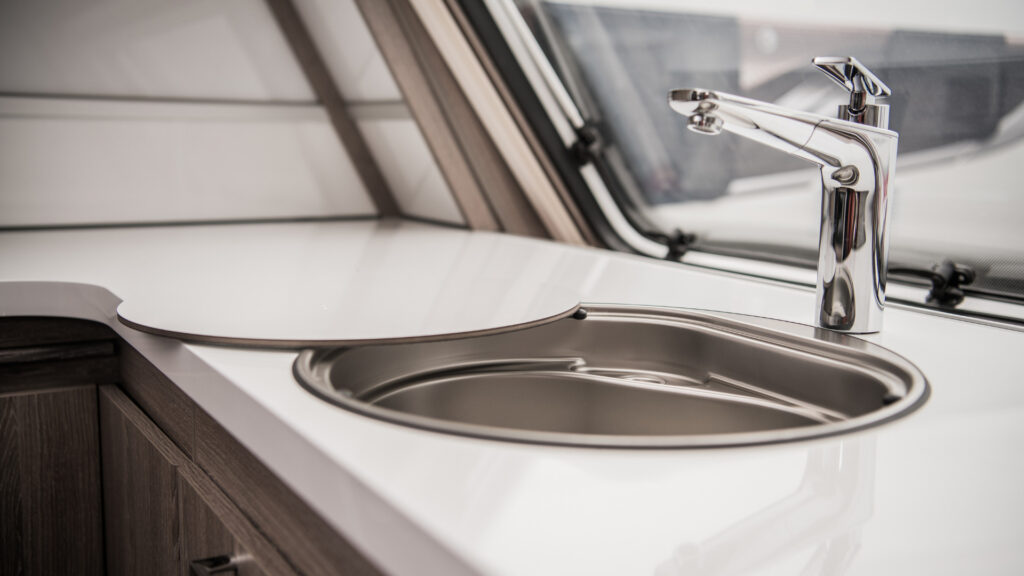
What Happens if I Get Antifreeze in My RV Water Heater?
You want to avoid getting RV antifreeze in your water heater. Filling your water heater with it will protect it from freezing temperatures. However, it is unnecessary.
For a more cost-effective and simpler option, pull the drain plug to empty your water heater instead. With a typical RV having a 6-gallon water heater, you won’t use nearly as much if you use this method.
Can I Dump RV Antifreeze on the Ground?
You should never dump any kind of antifreeze on the ground. While it is non-toxic to humans, it can still be toxic to pets, wild animals, and the environment.
You should dispose of your antifreeze, or any potentially harmful chemical, at a local recycling facility. Contact your local waste management facility to see what resources might be available in your area.
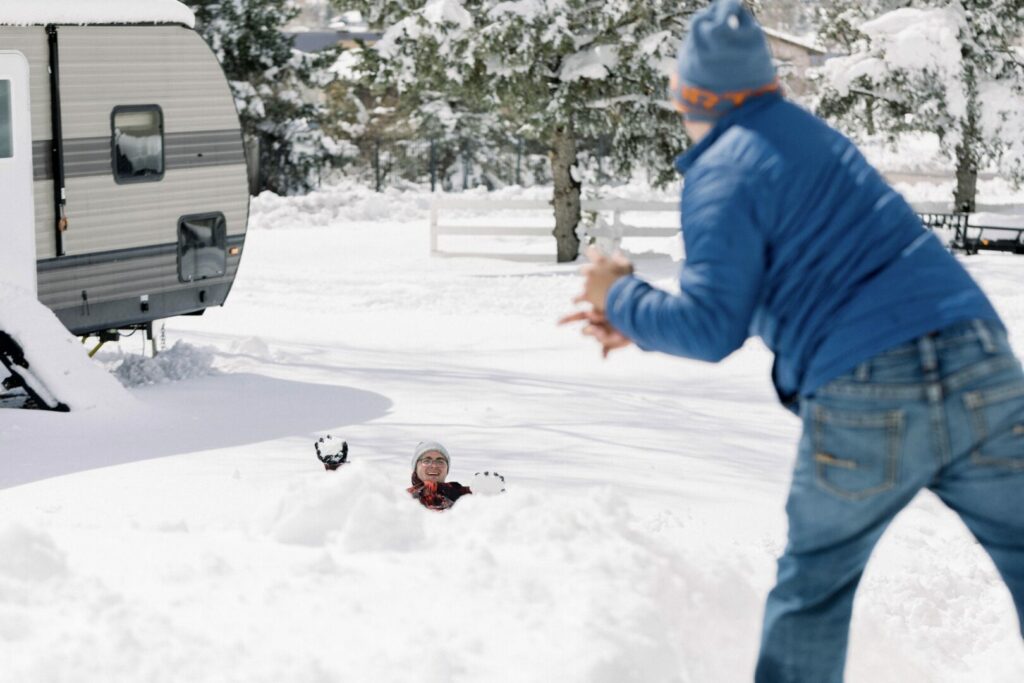
Food For Thought: Speaking of dumping products on the ground, you may have wondered Can You Dump Gray Water on the Ground When Dispersed Camping?
How Many Gallons of Antifreeze Does It Take to Winterize a Camper?
The amount of antifreeze you’ll need will depend on the size of your RV’s plumbing system.
Having multiple water faucets, showers, and bathrooms will mean you also have longer water lines, which will naturally require more antifreeze to fill them. However, 2 or 3 gallons will likely get the job done.
Pro Tip: Check out this guide on how to winterize your whole RV so it can be ready to go in the spring!
Winterize Your RV With Antifreeze
Winterizing your RV with a safe antifreeze will help ensure your rig is ready for your next camping season. You don’t want busted water lines and leaking fixtures. Towing your RV to a campsite is much more enjoyable and cheaper than towing it to the repair shop.
So make sure you protect your RV before the next drop in temperatures hits your area. Do you winterize your rig yourself or leave it to a professional?
Last update on 2025-01-19 / Affiliate links / Images from Amazon Product Advertising API




